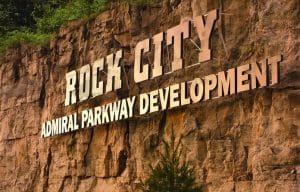Illinois looks to add EV chargers
Illinois’ electric vehicle charging infrastructure is on pace to double this year, buoyed by an influx of state and federal dollars.
Per Capitol News Illinois, the investments are aimed at supporting both federal and state environmental goals.
The Biden Administration set the goal of EVs making up half of all U.S. vehicle sales by 2030. Under the Climate and Equitable Jobs Act – Gov. JB Pritzker’s marquee climate law that passed in 2021 – Illinois aims to have one million EVs on the road by 2030.
These targets have spawned major infrastructure programs, which after years of planning and funding are seeing tangible results in Illinois.
State funding allocated in 2023 put Illinois on course to double the number of direct current, or DC, fast-charging ports on state roads within a year, from 993 to 1,914. The increase brings the number of fast-charging ports to over 25 percent of the 7,000 DC ports estimated to be needed to support the state’s EV goals.
In Illinois, several agencies are part of the effort to ensure EV charging infrastructure gets where it is needed, but the drive is coordinated by Megha Lakhchaura, the state electric vehicle coordinator at the Illinois Environmental Protection Agency.
“We expect that we will need 36,000 public charging ports to support one million EVs. Most of these will be level two chargers, but we will need close to 7,000 fast-charging ports by 2030,” Lakhchaura said. “We expect to have over 2,000 fast-charging ports by the end of 2024 if the chargers are installed on time.”
There are almost 2,300 level two charging ports in Illinois which fully charge a vehicle in 5-6 hours. The number of DC fast-charging ports, which can charge a vehicle in under an hour, increased in the last month from 993 to 1,010 ports.
The development of EV infrastructure will build on expansions completed last year. The number of electric vehicles in Illinois rose 60 percent last year – by more than 30,000 EVs – compared to the national average increase of 50 percent.
As of January, the Illinois secretary of state reported there were 93,821 EVs licensed for state roads.
There are three main sources of EV infrastructure funding: the federal Charging and Fueling Infrastructure grant program; the National Electric Vehicle Infrastructure program; and state funding from the Illinois Department of Transportation and IEPA.
Lakhchaura said building out EV charging infrastructure and educating the public on advancements in EV technology is an important step toward moving Illinois toward its climate goals.
The Illinois Finance Authority, in its role as the Illinois Climate Bank, received almost $15 million from the federal CFI grant to develop community-based charging stations. The grant will fund the construction of 881 charging stations. Only 36 of the 881 chargers will be DC fast chargers.
While DC chargers are faster, they are more expensive.
The state will continue to receive funds through NEVI to build DC fast chargers along alternative fuel corridors, networks of highways with infrastructure to support electric and hydrogen powered vehicles.
The program requires public charging stations be available at least every 50 miles along a corridor. Chargers must be publicly accessible 24/7 and be set up with combined charging system connectors and contactless payment options.
Illinois will receive $148 million between 2022 and 2027 to build a network of EV chargers along highways, starting with the interstate system.
Phase one of Illinois’ plan will use approximately $50 million to build chargers at 46 locations within eligible corridors.
Meanwhile, Illinois is implementing its own programs to meet the goals set under CEJA.
The IEPA will award $27 million dollars in grants to build DC fast-charging stations at public locations including hotels, shopping centers and gas stations. The grants are expected to be announced this month.
As part of CEJA, Illinois established a rebate program to incentivize the purchase of EVs. The program allows Illinois residents to collect a rebate for the purchase of an all-electric passenger vehicle from a recognized dealer.
The current rebate rate is $4,000 per vehicle.
In fiscal year 2023, 7,669 rebate applications were filled with 4,872 rebates awarded. The funding cycle for this year ended Jan. 30 with over 5,500 applications being received and the maximum funds being allotted.
Illinois school districts and bus companies purchased 180 electric school buses last year through the federal Clean School Bus Program. Lakhchaura said additional EV buses were purchased with funds from the Volkswagen settlement with a focus on communities that did not receive federal funds, such as Chicago.
The settlement was the conclusion of lawsuits filed against Volkswagen for violating Clean Air Act emissions standards by installing “defeat devices” in certain diesel models between 2009 and 2015. The established trust provided Illinois with over $1 million in funds for diesel emission reduction projects.
Time is another crucial factor in the expansion of EV charging, especially as the number of EVs on state roads must increase 10-fold for the state to meet its stated goal.
(article courtesy of Capitol News Illinois)






